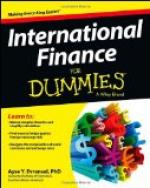A large part of the popular prejudice against financiers may thus be ascribed to anti-Semitic feeling. We are still like the sailor who was found beating a Jew as a protest against the Crucifixion, and, when told that it had happened nearly two thousand years ago, said that he had only heard of it that morning.
But, when we have purged our minds of this stupid prejudice, we are still faced by the fact that international finance is often an unclean business, bad both for the borrower and for the lender and profitable only to a horde of parasites in the borrowing country, and to those who handle the loan in the lending country, and get subscriptions to it from investors who are subsequently sorry that they put their eggs into a basket with no bottom to it. Under ideal conditions our money is lent by us, through a first-rate and honourable finance house, to a country which makes honest use of it in developing its resources and increasing its power to make and grow things. The loan is taken out from England in the shape of goods and services required for the equipment of a young country, and the interest comes in every year in the shape of food and raw material that feeds us and helps our industry. Such, it may be asserted with confidence, is the usual course of events, and must have been so, or England could not have been so greatly enriched by her moneylending operations abroad, and the productive power of the world could not have grown as it has, under the top-dressing that our finance and trade have given it. But though it is thus clear enough that the business must have been on the whole honestly and soundly worked, there have been some ugly stains on its past, and its recent history has not been quite free from unsavoury features.
In 1875 public opinion was so deeply stirred by the manner in which English investors and borrowing states had suffered from the system by which the business of international finance was handled, that a Select Committee of the House of Commons was “appointed to inquire into the circumstances attending the making of contracts for Loans with certain Foreign States and also the causes which have led to the non-payment of the principal moneys and interest due in respect of such loans.” Its report is a very interesting document, well worth the attention of those interested in the vagaries of human folly. It will astound the reader by reason of the wickedness of the waste of good capital involved, and at the same time it is a very pleasant proof of the progress that has been made in finance during the last half century. It is almost incredible that such things should have happened so lately. It is quite impossible that they could happen now.




